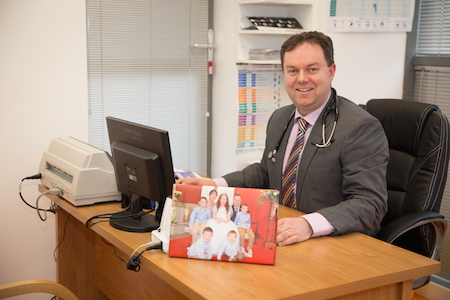This week Dr Ciaran Roarty of Scally/McDaid Medical Practice discusses what to do if your child develops chickenpox.
Chickenpox is an illness caused by a common virus called varicella-zoster. Most children will get it before they turn 10 and will produce antibodies to fight the infection. Usually the child will not get it again.
Symptoms:
High temperatures, aches and headache usually for a day or two before rash appears.
Spots which develop into itchy blisters which then scab over. These can be anywhere on the body and may cover a big area while some children may only have a few. They will fade over the following two weeks.
Reduced appetite
Some children are quite unwell while others are only mildly ill. Most children are much better within a week.
Complications of Chickenpox:
The spots usually heal without scarring unless they are badly scratched. Sometimes the spots may become infected with bacteria and your doctor may prescribe antibiotic creams or medicines for this.
Pneumonia or encephalitis (inflamation of the brain) are rare complications. Other very rare complications are inflamation of the heart, kidney, appendix, pancreas, testes, joints or eyes, as well as unsteadiness, and other conditions called HSP and Reyes syndrome.
Thankfully these serious complications are very rare but nevertheless keep an eye out for things like difficulty breathing, weakness, drowsiness, fits, pains or headaches not helped by paracetamol, refusing fluid due to mouth rashes, rashes which bruise or bleed into the skin, or indeed just becoming generally more and more ill.
Treatment:
Our body’s immune system fights the infection so treatment is aimed at making the child as comfortable as possible while the immune system goes to work.
Paracetamol helps lower the temperature and ease the child’s aches and pains. Ibuprofen is not recommended in treating chickenpox due to a small risk of adverse reactions. It is no longer advised to cool bathe children with fever or fan with cool air. Room temperature fans are fine from a distance
Fluid replacement is important, so make sure to give your child plenty to drink.
A soothing cream such as calamine lotion is often used though we are not entirely sure how effective it is.
A sedating antihistamine can help with sleep particularly if itch is a problem in children over 1. It is given at night.
Short fingernails help and comfortable clothing to make sure the child is not too warm or cold.
High risk children such as babies under a few months old, children on immune suppressing medication or children with other serious conditions should be seen by the doctor.
Is it infectious doctor?
Yes ! Very much so. The virus is spread in the air so being in the same room or having face to face conversations with someone with chickenpox gives a high likelihood of spread (if you have not had it before). Someone with chickenpox is infectious from 2 days before the rash appears until the spots have all crusted over ( usually about 5 days after rash onset).
We should keep children away from high risk patients such as pregnant women or patients with known immune problems. Children should be kept of nursery/school for 5 days from when the spots appear.
What about vaccinations?
While part of the childhood vaccination programme in the USA and Canada it is not yet part or our routine childhood vaccinations in this country.
What are Shingles doctor?
Shingles are caused by the same virus that causes Chickenpox and is basically a delayed complication of chickenpox. Shingles may occur because the chickenpox virus did not completely disappear when you had chickenpox as a child. Instead some virus particles remain inactive in the nerve roots next to your spinal cord, causing no harm or symptoms. Years later these virus particles may reactivate, travel along the nerve to the skin to cause shingles which develops as a rash and pain along a very distinct band like area of skin.
You can catch chickenpox from exposure to someone with shingles (if you have never had chickenpox before) but you cannot catch shingles from someone with chickepox or shingles!
The above information is intended as advice only and should you have any concerns contact your own Doctor.
Dr Ciaran Roarty MB BCh BAO MICGP DRCOG is a full-time GP at Scally McDaid Medical Practice , Scally Place, Letterkenny, Tel 0749164111






